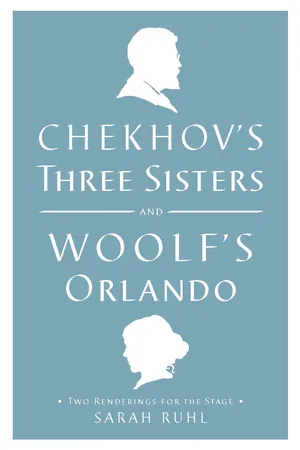
Chekhov's Three Sisters and Woolf's Orlando
Two Renderings for the Stage
- 224 pages
- English
- ePUB (mobile friendly)
- Available on iOS & Android
Chekhov's Three Sisters and Woolf's Orlando
Two Renderings for the Stage
About This Book
"[Ruhl's Orlando ] captures both the intellectual spirit and the literary brilliance of Woolf's work.... Ruhl writes with the imaginative sweep that allows Woolf's poetry to soar."— Variety
"Sarah Ruhl's smart new translation [of Three Sisters ] feels just right to contemporary American ears—lean, colloquial, and conversational for us and true to Chekhov's original work."— The Cincinnati Enquirer
In her stage adaptation of Virginia Woolf's gender-bending, period-hopping novel, award-winning playwright Sarah Ruhl "is her usual unfailingly elegant, unbeatably witty self, cleverly braiding her own brand-name wit with Woolf's" ( New York )magazine. Preserving Woolf's vital ideas and lyrical tone, Ruhl brings to the stage the life of an Elizabethan nobleman who's magically transformed into an immortal woman. In her fresh translation of Three Sisters, the Anton Chekhov classic of ennui and frustration, Ruhl employs her signature lyricism and elegant understanding of intimacy to reveal the discontent felt by fretful Olga, unhappy Masha, and idealistic Irina as they long to leave rural Russia for the ever-alluring Moscow.
Sarah Ruhl 's other plays include the Pulitzer Prize finalists In the Next Room (or the vibrator play) and The Clean House, as well as Passion Play, Dean Man's Cell Phone, Demeter in the City, Eurydice, Melancholy Play, and Late: a cowboy song. She is the recipient of a Whiting Writers' Award, a PEN/Laura Pels Award, and a MacArthur Fellowship. Her plays have premiered on Broadway, Off-Broadway, and in many theaters around the world.
Frequently asked questions
Information


Table of contents
- Cover
- Title Page
- Copyright
- Dedication
- Contents
- When Woolf Saw Chekhov, something of an introduction
- Three Sisters
- Orlando
- Acknowledgments
- About the Author